
Go to the source code of this file.
Macros | |
| #define | P4_VEC "SSE" |
| #define | P4_FPU " X87 SSE_DP" |
| #define | AMD_FPU "SPECULATIVE" |
| #define | P4_REPLAY_REAL_MASK 0x00000003 |
Variables | |
| papi_mdi_t | _papi_hwi_system_info |
| papi_vector_t | _perfctr_vector |
| pentium4_escr_reg_t | pentium4_escrs [] |
| pentium4_cccr_reg_t | pentium4_cccrs [] |
| pentium4_event_t | pentium4_events [] |
| static pentium4_replay_regs_t | p4_replay_regs [] |
| static int | pfm2intel [] |
Macro Definition Documentation
◆ AMD_FPU
| #define AMD_FPU "SPECULATIVE" |
Definition at line 72 of file perfctr-x86.c.
◆ P4_FPU
| #define P4_FPU " X87 SSE_DP" |
Definition at line 61 of file perfctr-x86.c.
◆ P4_REPLAY_REAL_MASK
| #define P4_REPLAY_REAL_MASK 0x00000003 |
Definition at line 903 of file perfctr-x86.c.
◆ P4_VEC
| #define P4_VEC "SSE" |
Definition at line 51 of file perfctr-x86.c.
Function Documentation
◆ _bpt_map_avail()
|
static |
Definition at line 266 of file perfctr-x86.c.
◆ _bpt_map_exclusive()
|
static |
Definition at line 295 of file perfctr-x86.c.
◆ _bpt_map_preempt()
|
static |
Definition at line 343 of file perfctr-x86.c.

◆ _bpt_map_set()
|
static |
Definition at line 275 of file perfctr-x86.c.

◆ _bpt_map_shared()
|
static |
Definition at line 305 of file perfctr-x86.c.

◆ _bpt_map_update()
|
static |
Definition at line 406 of file perfctr-x86.c.

◆ _papi_libpfm_ntv_code_to_bits_perfctr()
| int _papi_libpfm_ntv_code_to_bits_perfctr | ( | unsigned int | EventCode, |
| hwd_register_t * | newbits | ||
| ) |
Definition at line 1015 of file perfctr-x86.c.
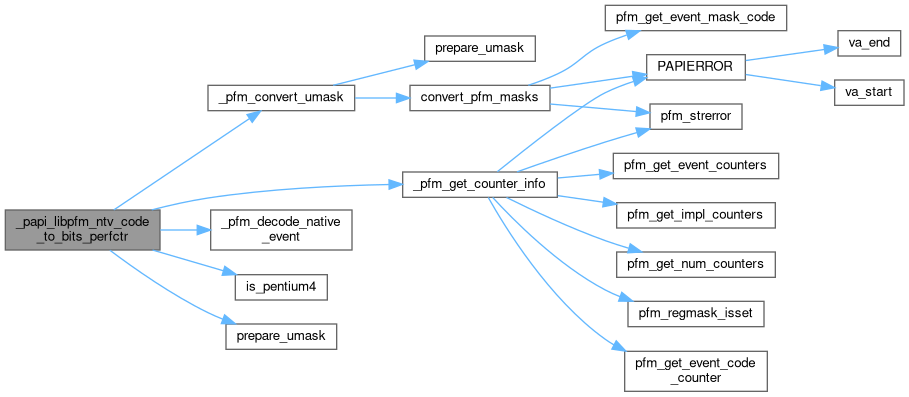

◆ _perfctr_ctl()
| int _perfctr_ctl | ( | hwd_context_t * | ctx, |
| int | code, | ||
| _papi_int_option_t * | option | ||
| ) |
Definition at line 295 of file perfctr.c.
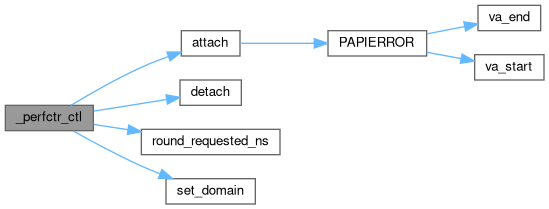
◆ _perfctr_dispatch_timer()
| void _perfctr_dispatch_timer | ( | int | signal, |
| hwd_siginfo_t * | si, | ||
| void * | context | ||
| ) |
◆ _perfctr_init_component()
Definition at line 107 of file perfctr.c.
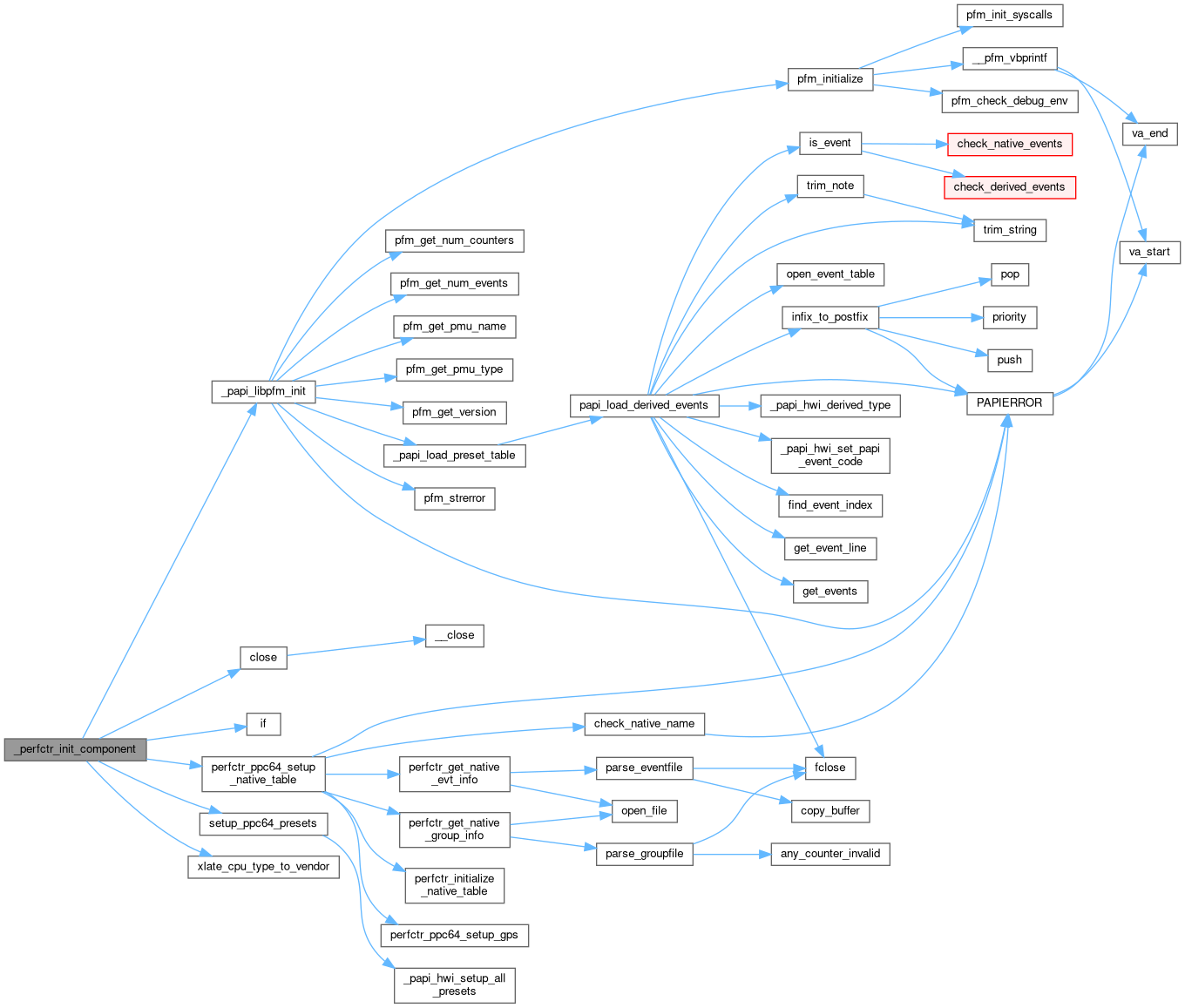
◆ _perfctr_init_thread()
| int _perfctr_init_thread | ( | hwd_context_t * | ctx | ) |
Definition at line 386 of file perfctr.c.
◆ _perfctr_shutdown_thread()
| int _perfctr_shutdown_thread | ( | hwd_context_t * | ctx | ) |
Definition at line 434 of file perfctr.c.
◆ _pfm_get_counter_info()
Definition at line 970 of file perfctr-x86.c.
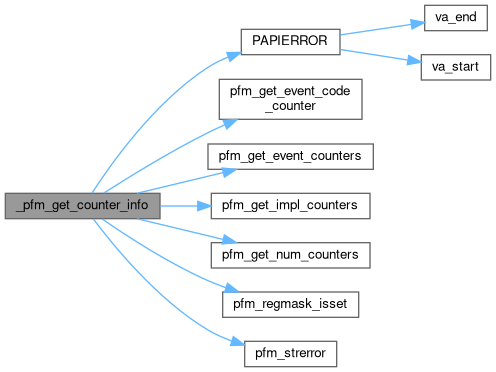

◆ _x86_allocate_registers()
|
static |
Definition at line 418 of file perfctr-x86.c.
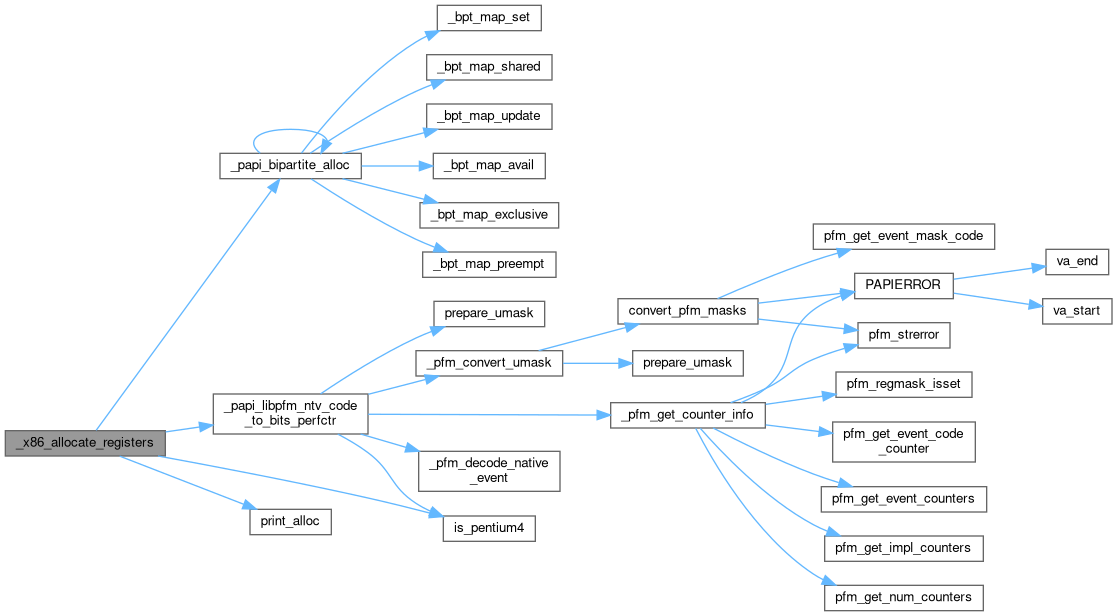
◆ _x86_init_control_state()
|
static |
Definition at line 119 of file perfctr-x86.c.

◆ _x86_read()
|
static |
Definition at line 701 of file perfctr-x86.c.

◆ _x86_reset()
|
static |
Definition at line 750 of file perfctr-x86.c.

◆ _x86_set_domain()
| int _x86_set_domain | ( | hwd_control_state_t * | cntrl, |
| int | domain | ||
| ) |
Definition at line 210 of file perfctr-x86.c.

◆ _x86_set_overflow()
|
static |
Definition at line 805 of file perfctr-x86.c.
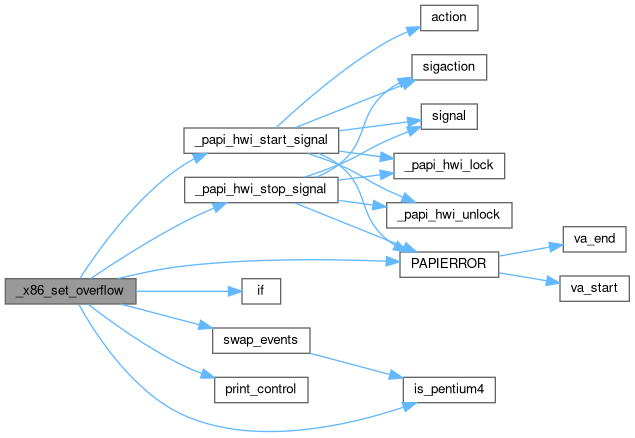
◆ _x86_start()
|
static |
Definition at line 653 of file perfctr-x86.c.


◆ _x86_stop()
|
static |
Definition at line 679 of file perfctr-x86.c.

◆ _x86_stop_profiling()
|
static |
Definition at line 890 of file perfctr-x86.c.
◆ _x86_update_control_state()
|
static |
Definition at line 550 of file perfctr-x86.c.

◆ clear_cs_events()
|
static |
Definition at line 504 of file perfctr-x86.c.


◆ is_pentium4()
|
inlinestatic |
Definition at line 75 of file perfctr-x86.c.
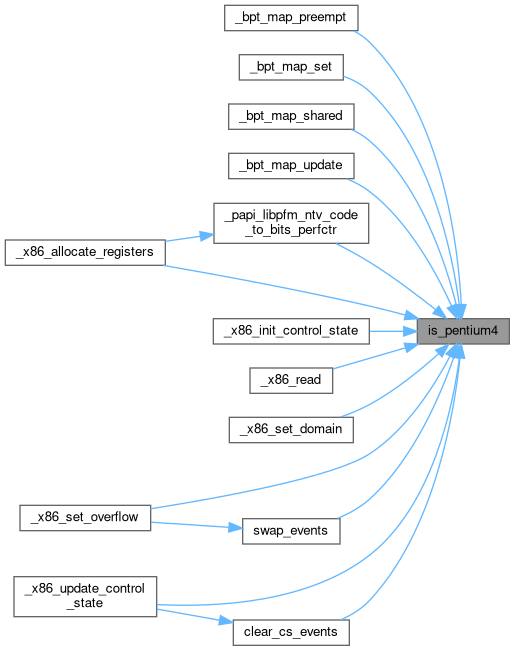
◆ print_alloc()
|
static |
◆ print_control()
| void print_control | ( | const struct perfctr_cpu_control * | control | ) |
Definition at line 96 of file perfctr-x86.c.
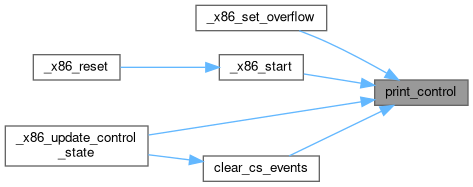
◆ swap_events()
|
static |
Definition at line 762 of file perfctr-x86.c.


Variable Documentation
◆ _papi_hwi_system_info
|
extern |
Definition at line 56 of file papi_internal.c.
◆ _perfctr_vector
| papi_vector_t _perfctr_vector |
Definition at line 1163 of file perfctr-x86.c.
◆ p4_replay_regs
|
static |
Definition at line 910 of file perfctr-x86.c.
◆ pentium4_cccrs
|
extern |
pentium4_cccrs
Array of counter-configuration-control registers that are available on Pentium4.
Definition at line 242 of file pentium4_events.h.
◆ pentium4_escrs
|
extern |
pentium4_escrs
Array of event-selection-control registers that are available on Pentium4.
Definition at line 51 of file pentium4_events.h.
◆ pentium4_events
|
extern |
pentium4_events
Array of events that can be counted on Pentium4.
Definition at line 607 of file pentium4_events.h.
◆ pfm2intel
|
static |
Definition at line 958 of file perfctr-x86.c.
